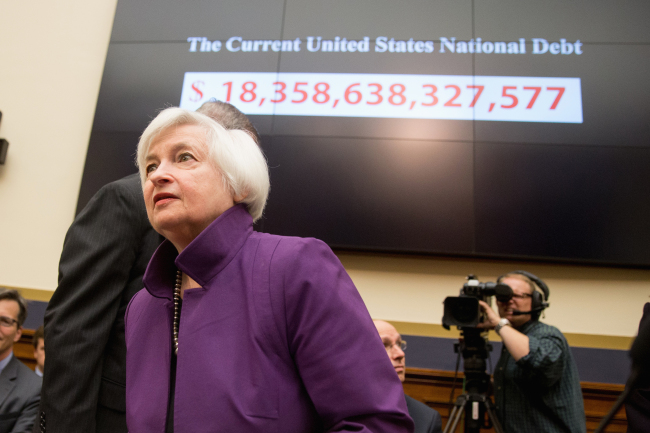Korea’s financial market showed a tolerance to U.S. Federal Reserve chair Janet Yellen’s remarks signaling a rate hike in December on Thursday, though its stocks and currency lost compared to the previous trading session, analysts said.
The U.S. dollar rose by 0.57 percent to finish at 1,138.5 won on growing projections in the global futures trading market that the Fed was moving to raise its key interest rate on the next meeting of the Federal Open Market Committee, slated for Dec. 15-16.
Like the weakness of the Korean currency, the benchmark KOSPI dropped 0.16 percent or 3.36 points from a session earlier to close at 2,049.41.
 |
Federal Reserve Chair Janet Yellen passes a national debt banner as she arrives on Capitol Hill in Washington on Nov. 4 to testify before the House Financial Services Committee hearing on banking supervision and regulation. (AP) |
Nevertheless, the negative impacts from Yellen’s hinting at a hike appeared not to be critical when compared to the situation from August to September.
From Aug. 5 to Sept. 15, foreign investors dumped local stocks for 29 consecutive trading sessions amid concerns of a hike at the Sept. 16-17 FOMC gathering. But the Fed left the rate untouched at the meeting.
Shifting their position, foreigners net purchased local equities worth 366.5 billion won ($322 million) over the past month.
Though they turned to a net-seller on Thursday, the amount stayed at 37 billion won worth.
The Korea Center for International Finance said the situation is somewhat different from September.
“The possibility that the dollar will gain sharply (to the 1,200 won mark) like last September is not high,” said KCIF.
The institute predicted that the greenback’s strong position would change gradually, if showing any change. It added that the issue determining the exchange rate direction would be economic indexes, to be publicized in the U.S.
A research analyst on TV stressed that investors seemed to have become resistant to the likelihood of the U.S. hikes.
“The remaining issue is whether the rate hike extent would be drastic or gradual,” he said. “Though overseas investors are expected to pull out their funds from emerging markets including Korea if the FOMC raises it in December, the possible capital outflow would be restricted as a short-term basis.”
He said that an improvement in U.S. indexes could indicate that the world’s economy is also recovering, which could eventually have a positive effect on the Korean financial market.
By Kim Yon-se (
kys@heraldcorp.com)








![[Weekender] Korea's traditional sauce culture gains global recognition](http://res.heraldm.com/phpwas/restmb_idxmake.php?idx=644&simg=/content/image/2024/11/21/20241121050153_0.jpg)